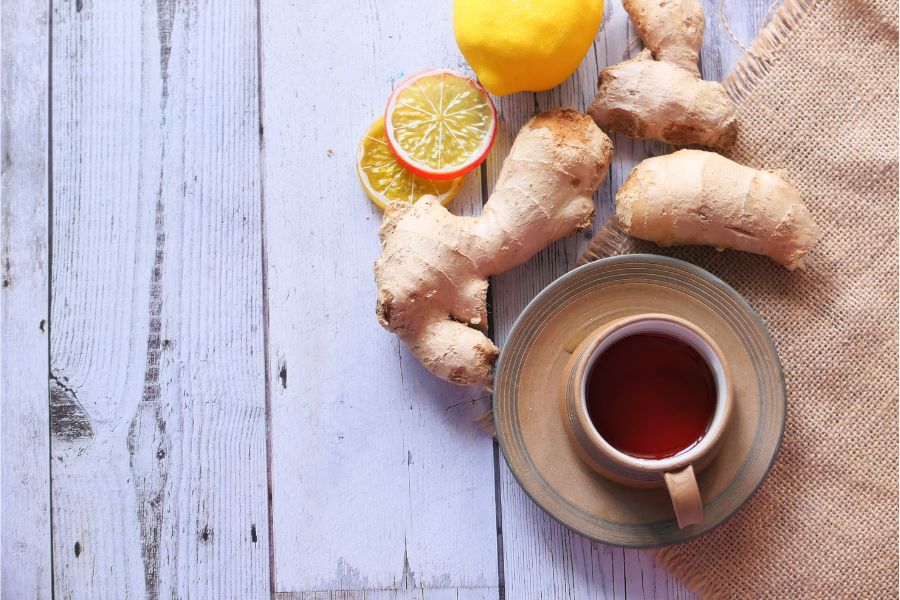Vertigo, characterized by a spinning sensation and loss of balance, affects millions of people, significantly impacting their daily lives. With the limitations and side-effects of conventional treatments, there's a growing interest in exploring natural and herbal remedies.
This article will delve into the efficacy, benefits, and uses of various herbal remedies that provide relief from vertigo.
Understanding Vertigo
 Vertigo is a symptom of several different conditions, typically originating from issues in the inner ear or brain, causing dizziness, loss of balance, and sometimes nausea.
Vertigo is a symptom of several different conditions, typically originating from issues in the inner ear or brain, causing dizziness, loss of balance, and sometimes nausea.
In the US, it’s estimated that approximately 40% of people will experience vertigo at some point in their lives [1].
While there are pharmaceutical treatments available, they can often come with undesirable side effects, steering people towards more natural alternatives.
Why Herbal Remedies?
Herbal remedies have been utilized for centuries across cultures, providing solutions to various health conditions.

In recent years, there’s been a resurgence in their popularity, thanks to their natural origins, fewer side effects, and a holistic approach to health.
For vertigo, several herbs have been identified to help alleviate symptoms and improve overall well-being.
Top Herbal Remedies for Vertigo
-
Ginger
 Ginger is renowned for its anti-inflammatory and anti-nausea properties. Studies suggest that ginger may improve symptoms of vertigo by influencing the nervous system and reducing inflammation [2]. It can be incorporated into the diet as a spice, tea, or supplement.
Ginger is renowned for its anti-inflammatory and anti-nausea properties. Studies suggest that ginger may improve symptoms of vertigo by influencing the nervous system and reducing inflammation [2]. It can be incorporated into the diet as a spice, tea, or supplement. -
Ginkgo Biloba
 Known for improving blood flow to the brain, Ginkgo Biloba has been studied for its potential in treating vertigo. Research indicates that it can reduce symptoms and improve quality of life for individuals dealing with balance disorders [3].
Known for improving blood flow to the brain, Ginkgo Biloba has been studied for its potential in treating vertigo. Research indicates that it can reduce symptoms and improve quality of life for individuals dealing with balance disorders [3]. -
Valerian Root
 Valerian root is traditionally used to alleviate anxiety and stress. Some studies suggest that it can be beneficial for stress-induced vertigo, offering a calming effect on the nervous system [4].
Valerian root is traditionally used to alleviate anxiety and stress. Some studies suggest that it can be beneficial for stress-induced vertigo, offering a calming effect on the nervous system [4]. -
Lemon Balm
 Lemon Balm, appreciated for its calming properties, can help reduce the frequency and intensity of vertigo attacks by acting on the central nervous system [5].
Lemon Balm, appreciated for its calming properties, can help reduce the frequency and intensity of vertigo attacks by acting on the central nervous system [5]. -
Peppermint
 Peppermint is effective in alleviating nausea, a common symptom of vertigo. Peppermint oil or tea can be used as a soothing remedy [6].
Peppermint is effective in alleviating nausea, a common symptom of vertigo. Peppermint oil or tea can be used as a soothing remedy [6]. -
Basil
 Basil offers calming effects on the nervous system and can be an effective remedy for relieving vertigo symptoms [7].
Basil offers calming effects on the nervous system and can be an effective remedy for relieving vertigo symptoms [7].
How to Use Herbal Remedies for Vertigo
Herbal remedies can be used in various forms such as teas, supplements, and essential oils.
It’s essential to adhere to suggested dosages and consult with healthcare professionals, especially if combining different herbs or if you have pre-existing conditions.
Pregnant or breastfeeding women should exercise additional caution.
Consulting Healthcare Professionals
Before embarking on any new treatment, consulting a healthcare professional is paramount.
Discussing herbal remedies with doctors ensures safe and effective use, especially for individuals with underlying health conditions or those taking other medications.
Conclusion
 Herbal remedies offer a promising alternative for those seeking natural vertigo relief. By exploring these options cautiously and under professional guidance, individuals can potentially find a suitable solution to manage their symptoms and improve their quality of life.
Herbal remedies offer a promising alternative for those seeking natural vertigo relief. By exploring these options cautiously and under professional guidance, individuals can potentially find a suitable solution to manage their symptoms and improve their quality of life.
Have you tried any of these herbal remedies for vertigo? Share your experiences across our social media and pass along this article to friends or family who might benefit from it.
AV Wristbands for Vertigo
With a blend of practicality and holistic wellness, AV wristbands have emerged as a supportive tool for individuals dealing with the challenges of vertigo.
For those experiencing the disorienting symptoms of vertigo, AV wristbands can offer a subtle yet impactful layer of support, helping wearers navigate their daily routines with an added sense of confidence and ease.
AV users have reported improvements in their vertigo symptoms and an overall enhanced sense of well-being.
About the Author
Nathan Carter has been a highly qualified health and fitness professional for the past twenty years. Educated at the University of Bath, Nathan has been on a path of professional and personal development ever since, helping thousands of clients to achieve their health and wellness goals. He has hundreds of published articles in both printed and online media.
References
-
National Institute on Deafness and Other Communication Disorders (NIDCD). (2021). Dizziness and Balance Disorders.
-
Grontved, A., Brask, T., Kambskard, J., & Hentzer, E. (1988). Ginger root against seasickness. A controlled trial on the open sea. Acta Otolaryngol, 105(1-2), 45-49.
-
Ogun, O. A., Buki, B., Cohn, E. S., Janky, K. L., & Lundberg, Y. W. (2019). Ginkgo Biloba and Vestibular Compensation: A Review. Frontiers in neurology, 10, 211.
-
Andreatini, R., Sartori, V. A., Seabra, M. L., & Leite, J. R. (2002). Effect of valepotriates (valerian extract) in generalized anxiety disorder: a randomized placebo-controlled pilot study. Phytotherapy Research, 16(7), 650-654.
-
Cases, J., Ibarra, A., Feuillère, N., Roller, M., & Sukkar, S. G. (2011). Pilot trial of Melissa officinalis L. leaf extract in the treatment of volunteers suffering from mild-to-moderate anxiety disorders and sleep disturbances. Mediterranean journal of nutrition and metabolism, 4(3), 211-218.
-
Alammar, N., Wang, L., Saberi, B., Nanavati, J., Holtmann, G., Shinohara, R. T., & Mullin, G. E. (2019). The impact of peppermint oil on the irritable bowel syndrome: a meta-analysis of the pooled clinical data. BMC complementary and alternative medicine, 19(1), 21.
-
Imanshahidi, M., & Hosseinzadeh, H. (2006). The pharmacological activities of Ocimum basilicum. Iranian journal of basic medical sciences, 9(2), 87-92.



